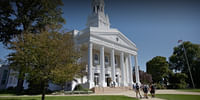The Physics Department strives to educate all of its students, from humanities and social science students fulfilling the science perspective to physics majors planning to do graduate work, about the fundamental laws of the physical world through experimentation, creative problem-solving and critical analysis. We accomplish this in an active learning environment including laboratories, appropriate educational technologies and opportunities for faculty-guided research. We have the additional goals of preparing physics and physical science majors for graduate school, and careers in research, engineering and education.
?The skills developed help prepare the graduate for the ever-changing technical world in which we live and for life in general.
The department?s faculty members are dedicated to undergraduate teaching. The introductory course for majors is Workshop Physics, where the class meets in the laboratory for an in-depth experimental investigation of physical principles. Advanced physics courses have typical class sizes of four to eight students, which are small enough to allow the kind of individualized teaching which physics really requires. Nearly all the advanced physics students engage in individual research projects with a faculty mentor. Recent research projects have included work in areas of experimental high energy physics, the physics of music, observational astronomy, remote sensing using satellite data, and physics pedagogy.














